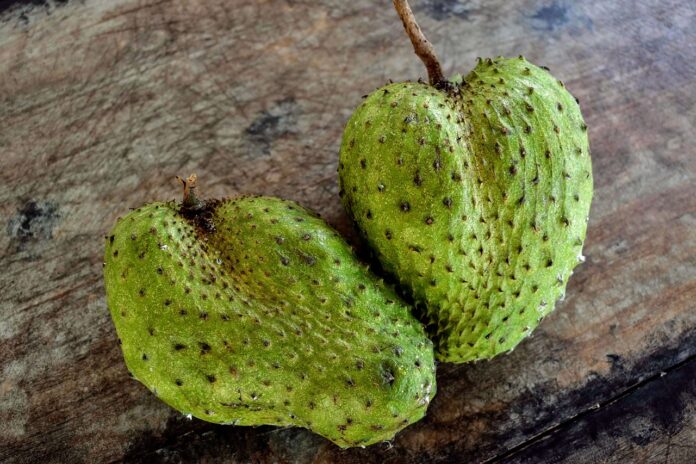Soursop, known scientifically as Annona muricata, is a tropical fruit native to the rainforests of the Americas. It is also commonly referred to as guanabana. The soursop tree can grow up to 30 feet tall and thrives in warm, humid climates. The fruit itself is notable for its large size, often weighing between 2 to 15 pounds, with a spiky green skin and soft, white, fibrous pulp inside.
Interesting Facts About Soursop:
- The taste of soursop is distinctive, often described as a blend of strawberry and pineapple, with hints of citrus and a creamy banana-like texture. It is popular in many cuisines around the world and is commonly used in drinks, desserts, and candies.
- Scientific Name and Family: Soursop, Annona muricata, belongs to the Annonaceae family, also known as the custard apple family. This family contains over 2,400 plant species, many of which produce fruits known for their sweet, custard-like pulp. The soursop tree is native to the tropical regions of the Americas, from the Caribbean to northern South America
- The world’s largest soursop was grown in Honaunau, Hawaii, by Ken Verosko and Beth Smith at their South Kona Fruit Stand and Farm. The massive fruit measured 24 inches in circumference and 11.5 inches in length. It was certified by Guinness World Records
- Health Benefits: Antioxidants like luteolin and quercetin in soursop help protect cells from oxidative damage, which is linked to aging and chronic diseases. Additionally, the fruit’s anti-inflammatory properties may assist in managing conditions like arthritis. Although these benefits are promising, most studies are preclinical, and further research is needed
- Popularity in Herbal Remedies: Soursop tea, made from the leaves, has a grassy and slightly sweet flavor. It’s often consumed to help with relaxation and improve sleep quality. In herbal medicine, different parts of the soursop plant are thought to help boost the immune system and alleviate pain
- Global Names: Soursop is known by different names depending on the region. In Spanish-speaking countries, it’s called “guanábana,” while in Brazil, it’s referred to as “graviola.” These variations often reflect the local culinary and cultural practices associated with the fruit
- Caution with Seeds: Soursop seeds contain annonacin, a neurotoxin that can cause nerve damage and neurodegenerative conditions if ingested in large quantities. Traditionally, these seeds have been crushed and used as an effective natural insecticide against lice and bedbugs
- Sensitive to Climate: Soursop trees flourish in warm, tropical environments with high humidity. Cold temperatures can damage or even kill the tree, which limits where it can be grown. This sensitivity is one reason why soursop remains relatively rare in markets outside tropical regions
- Height and Size: The tree can reach 13 to 30 feet in height, and its fruits vary from small to very large, typically measuring 8 to 12 inches in length. The fruits are known for being heavy and dense, making soursop a prominent presence in tropical fruit markets
- Historical Spread: European explorers and traders helped spread soursop seeds from the Americas to the Old World Tropics. Over time, it became a common fruit in many regions, including West Africa, Southeast Asia, and the Pacific Islands, where it is grown both for its fruit and medicinal properties
- Popular in Latin American Cuisine: Soursop is a staple in many Latin American dishes, where it is enjoyed in various forms. It’s used in sweet treats like candies and blended into beverages. Agua fresca, a refreshing drink made from soursop pulp, water, and sugar, is particularly popular in Mexico
- Use in Natural Insect Repellents: The insect-repelling properties of soursop are due to natural chemicals found in the seeds and leaves. These properties have made it an eco-friendly alternative to synthetic insecticides in tropical regions
- Fruit’s Shelf Life: Fresh soursop fruit has a short shelf life and can spoil quickly if not properly stored. To preserve its flavor and nutritional content, it is often frozen or processed into juices, making it easier to export
- Warnings from Health Authorities: The U.S. Food and Drug Administration (FDA) has not approved soursop for medicinal use. Some studies have linked excessive consumption of soursop to neurotoxicity, raising concerns about its safety in high doses
